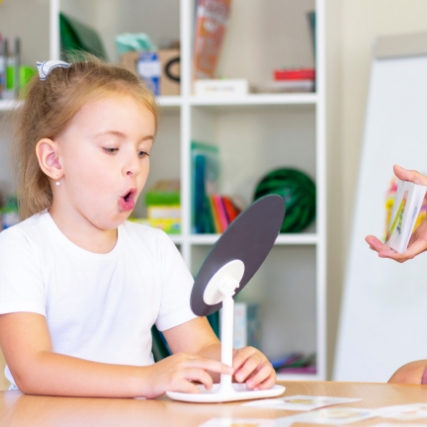Pediatric occupational, physical, and speech therapies
help children develop skills necessary to grow to be functional, independent adults. Physical impairment, injuries, and other congenital issues may hinder your child’s ability to play safely or perform meaningful activities in everyday life. Our experienced therapists specialize in assisting children to achieve developmental milestones.
Occupational Therapy
Occupational Therapists assist children with sensory, physical, and cognitive challenges to be as independent as possible. We use a variety of treatment approaches including sensory integration, listening programs, and the astronaut program to improve functioning. The astronaut program uses movement and sound to help kids retrain their bodies for better balance, motion, and understanding of where their body is in space. What is considered an occupation? Playing, learning, and interacting with others are all part of a child’s “occupation.” Examples include constructing puzzles, using scissors, or playing catch.
Does My Child Need Occupational Therapy?
- Difficulty adapting to new environments
- Hyperactivity or low energy
- Constantly moving, jumping, crashing, bumping
- Not reaching developmental milestones
- Picky eater
- Sensitive to touching different textures
- Overly focused on one subject (ex. Space, Dinosaurs, Trains)
- Struggling with interacting with other children.

Physical Therapy
Physical Therapists focus on achieving the maximum potential of independent function through optimal participation in home, school, community, and play environments. Physical therapists help kids improve their range of motion, strength, flexibility, and movement patterns to the best of their abilities. We channel our inner child to enhance kids’ abilities to move independently and safely throughout their environments.

Does My Child Need Physical Therapy?
- Seems clumsy or uncoordinated
- Overly rough when playing
- Difficulty imitating actions
- Walks on toes, poor posture, sits in "W" position
- Complains of pain with gross motor activities
- Difficulty following verbal directions
- Disruptive behaviors, impulsive, limited attention, resistant to new activities/changes in routine
Speech Therapy
Speech Therapists evaluate speech and language development and develop treatment procedures to maximize and enhance communication skills as well as to support feeding skills. Our therapists love to hear when a child says a first word, signs for the first time, or clearly expresses a word. Whether a child has difficulty saying certain speech sounds correct, has limited language to verbally express their wants and needs, has difficulty understanding language concepts, has stuttered speech, has difficulty using appropriate communication in a social setting (poor eye contact, perseverating on a specific topic or difficulty understanding other nonverbal communication skills like appropriate personal space) or difficulty feeding, our Speech Therapists have expertise in evaluating and treating these communication-related issues children sometimes face.

Does My Child Need Speech Therapy?
- Decreased eye contact during interactions
- Doesn't imitate sounds or simple words by 12 months
- Continues to use more gestures than words at 18 months
- Speaks fewer than 100 words by 24 months
- Difficulty understanding your child's speech at 24 months
- Difficulty engaging with peers in pretend play at 3-4 years
- Excessive drooling, as well as problems sucking, chewing, or swallowing

